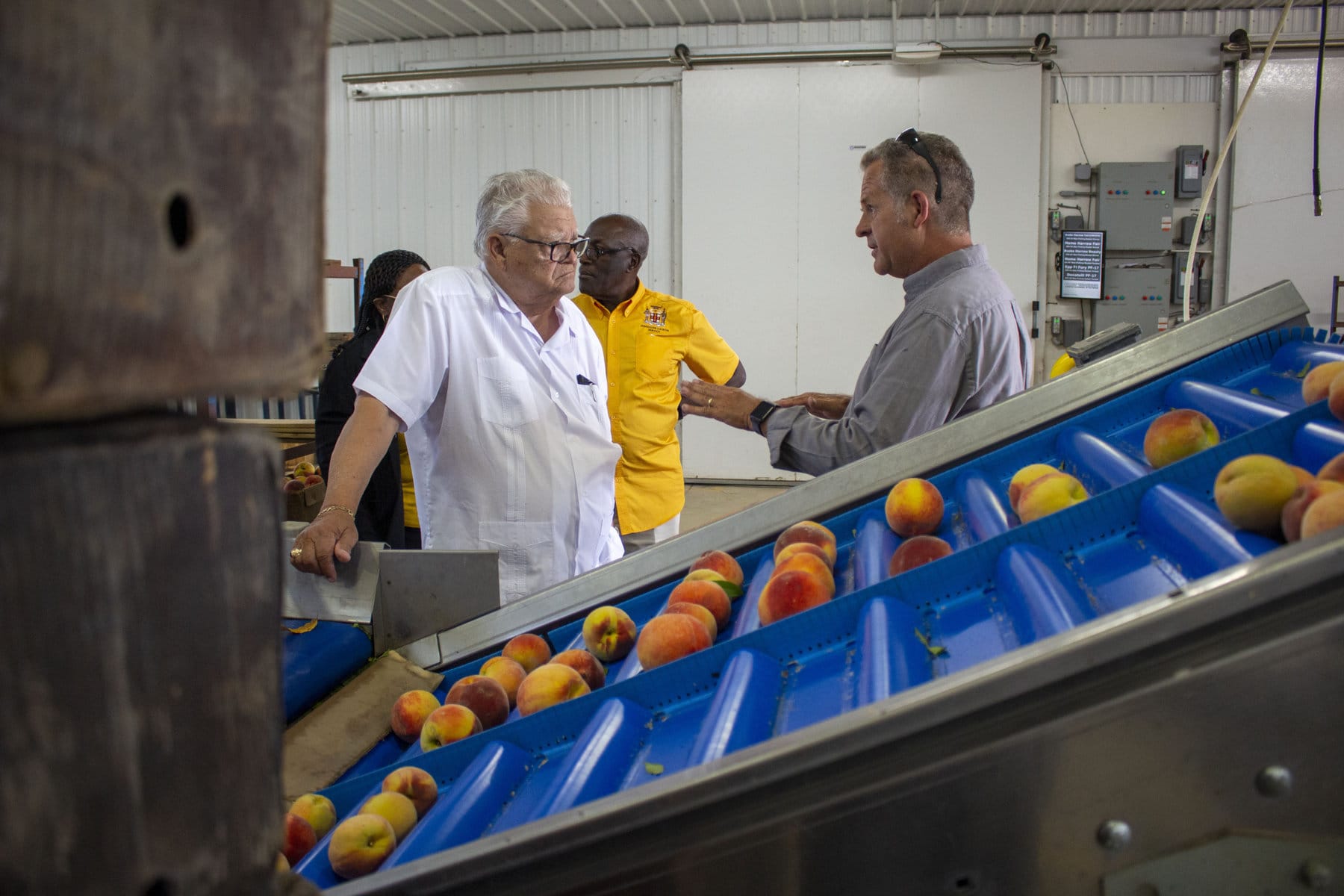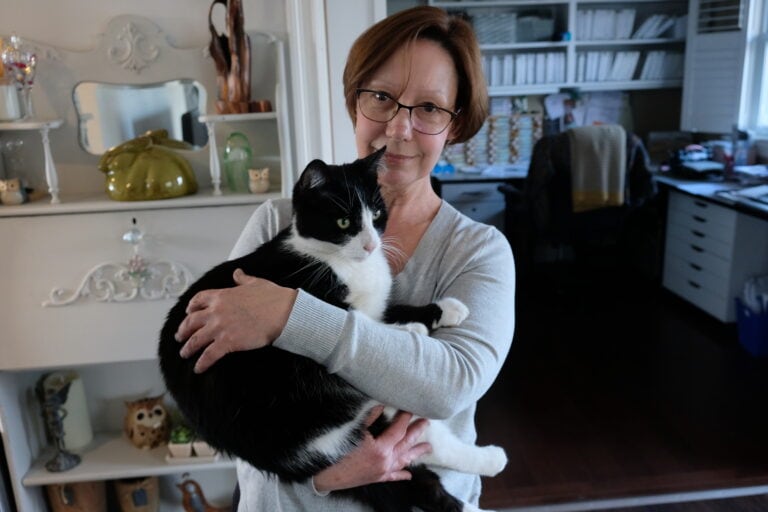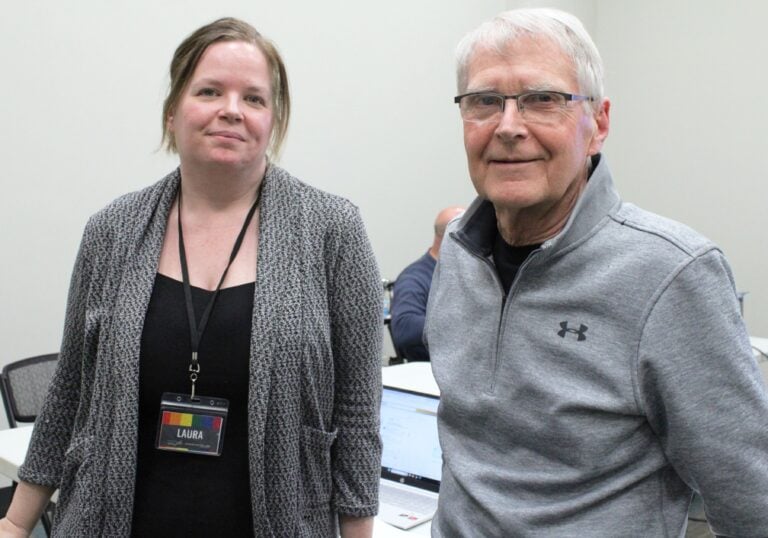A few Niagara-on-the-Lake farmers had a special guest on Monday, as Jamaica’s labour minister toured some of the businesses that are part of Canada’s Temporary Foreign Workers program that brings in seasonal farmworkers.
Karl Samuda was at Kai Wiens’ family farm in the afternoon, checking out the peach growing and packing operation, which is run mostly by Jamaican workers.
He paid close attention as Wiens explained the farm’s procedures and took Samuda and a group visitors through the operation.
After the walkthrough, Samuda gave the workers a brief speech.
“I want everyone here to realize, you are an integral part of this (business). He owns it, but he can’t run it. He manages it, he lays down the laws of how it should be done, but you do what is necessary to make him succeed,” he said.
“I want to see you do as well as you can, so that you can take your rightful place in Jamaica as someone who has succeeded to carve out a quality of life for yourself that can give you pride.”
Before Samuda arrived, Wiens told The Lake Report he sees the occasion as a good chance for the labour minister to meet farmers and see what Jamaican workers are doing in Canada.
Wiens, who has operated his farm since 1987, has had several workers with him for more than a decade, including many who have “pensioned out” and now enjoy a Canadian pension.
In his speech, Samuda pointed out that one of the female workers had been there for more than 20 years.
“What is encouraging, and should be encouraging, is after 20-odd years, she still has a smile on her face. She still looks at her boss in an admiring way, and he at her in the same way. That’s wonderful. That’s a nice relationship to have at the work,” he said.
Wiens said he knows farm life isn’t perfect, but as an employer, it’s in his interest to keep his workers happy.
He can’t recall any major conflicts in his time running the farm.
“Will there be conflicts? In a house with 10 people? Yes,” he said.
He notes labour laws for farm workers are “hugely strong.”
“If I have a dispute, it is my responsibility as the employer to resolve the situation in a timely manner,” he said.
“I think it’s obvious that it’s best to do it that way. But it’s a much stronger legislation than the Employment Standards Act.”
Wiens is well aware of farm worker advocacy groups, who are fighting for the rights of farm workers. He said many of the issues facing farm workers in Canada aren’t actually in the hands of farmers themselves.
For example, a common plight of farm workers is that they want an easier path to permanent residency in Canada after working here for several years.
“That’s an immigration issue,” Wiens said.
He also said in terms of housing for workers, he does the best he can — his homes appear to be in good condition.
But he said there are plenty of hurdles to overcome when building a dwelling unit on a commercial farm — processes that don’t necessarily make sense for farms and that end up affecting the workers if farmers can’t build, or can’t afford to do so at a reasonable cost because of development fees, etc.
But again, that’s not a farming issue, he said.
Allison Levy, a first-year farm worker at Wiens’ farm, said so far the job is going well.
“Ups and downs, but it’s OK,” she said.
Like many of the workers, she said the only things she wants is more hours. She’s here to work, so the more money she can earn, the better.
She’d also like it the government to make it easier to become a permanent resident.
“We’ve gone through all the process that we are good citizens. I don’t think it’s a hard process to do,” she said.
David Reid, a 13-year employee of Wiens’, said he’s never felt that he couldn’t come forward if there was a problem he wanted to address. But, he said so far, there hasn’t been any.
“I haven’t had that issue with my boss,” he said.
Granville Valentine, general secretary of Jamaica’s National Workers Union, said he had heard some concerns from workers.
“Some of the workers would speak about the level of respect, how they are spoken to, and that is of concern, but we understand that you hear one side,” he said.
On the other hand, “some of the employers will talk about a few new workers and a reluctance of co-operating, especially with the older workers or the more experienced workers,” he said.
“And we are going to look to see how we can help back to in terms of our mentorship and our pep talks, motivation speeches, etc., as we think that can help those and prepare them for the program.”
He said some workers expressed concerns about housing and accommodation.
“We would want to ensure that it is one that is up to par in terms of persons should feel comfortable enough. We’re not looking for a palace, but we are looking for something decent that will not threaten the health of anyone.”
It’s important to keep these farm worker programs going, and “continue to work as a team with farmers, owners, the management team, the liaison services and the workers,” he said.











